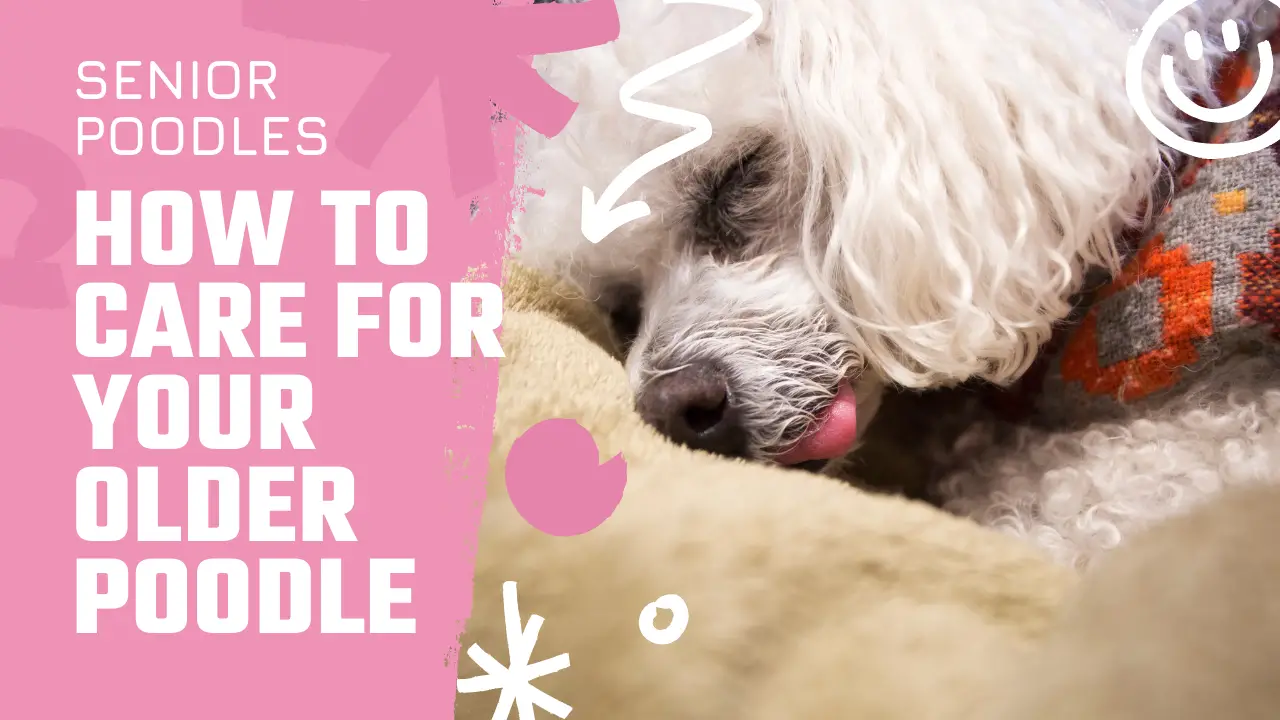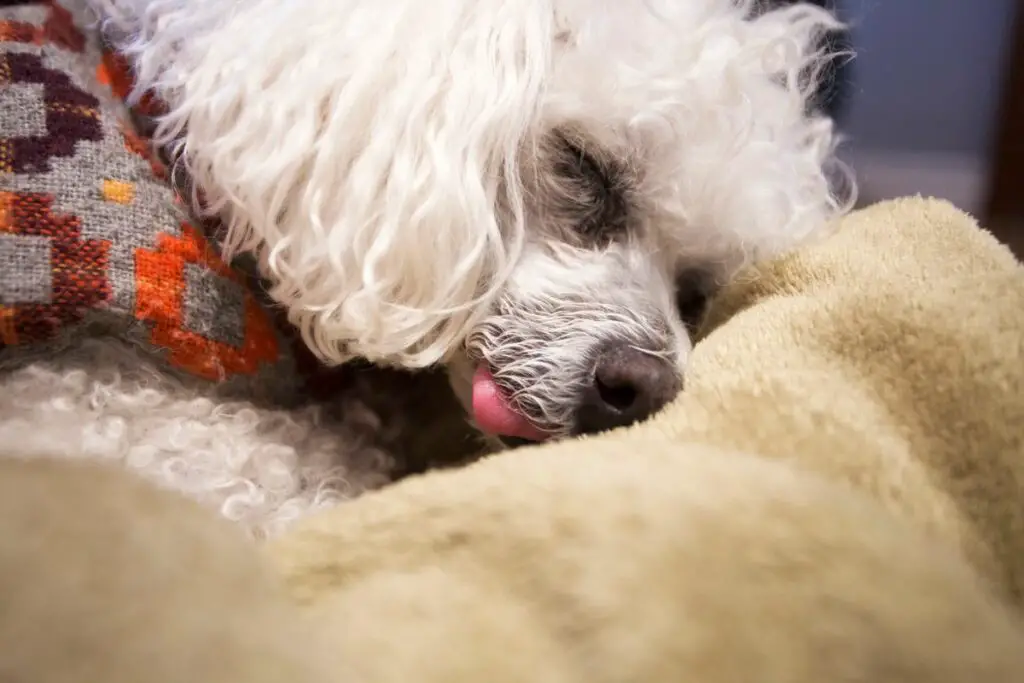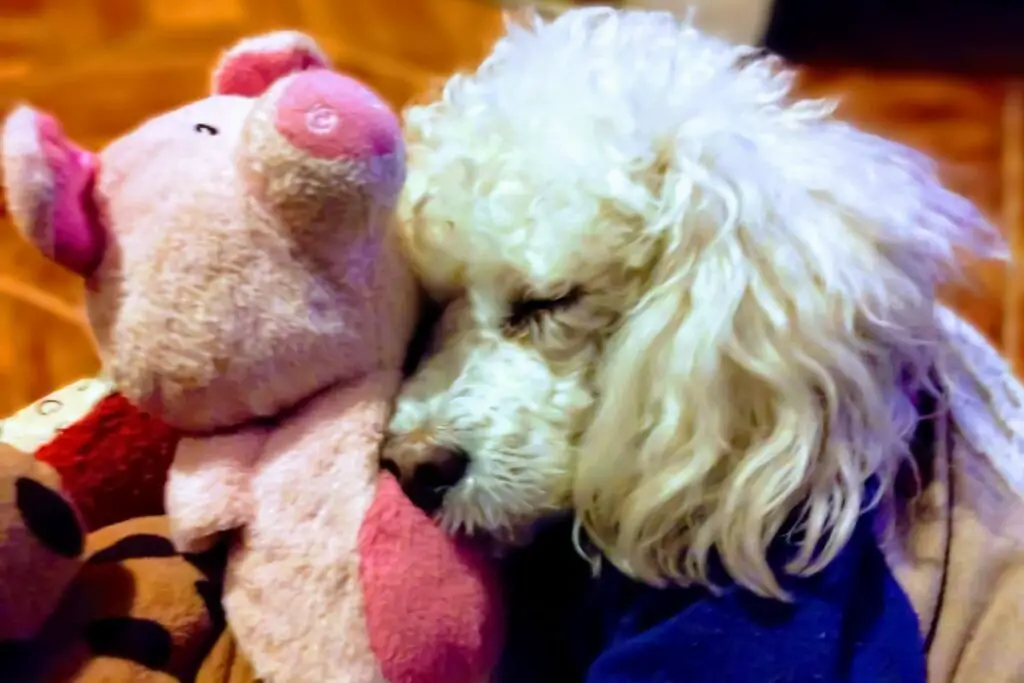No matter how much experience you have as a pet owner, caring for a senior dog can be challenging. Your older dog may need to see the vet more often, eat a special diet, or even take medicine. However, there are many ways you can make your senior pooch’s life comfortable and enjoyable. With a little extra care, your elderly poodle can live a long and happy life. Here are some tips on what to expect and the best ways to care for your senior poodle.

What Will You Learn? 👇
When do Poodles Become Seniors?
Just like humans, a senior Poodle can live a long, happy, and active life. As your poodle approaches 7 years old, you might notice your once-bouncy dog starting to change. Most canine experts consider a dog that is 7+ years old to be a senior.
For smaller breeds like the Mini and Toy Poodle, they are classed as senior when about 9-10, rather than 7 years old.

Read our Smart Poodles - Smart Tricks eBook for only $2.99
Dive into a treasure trove of engaging tricks and tips designed specifically for your poodle!
Turning 7 doesn’t automatically mean that your thriving dog turns into an elderly shadow of himself. Instead, you may start to notice signs of aging creeping up on him. He may drowse more or get up stiff after a nap. You might also notice that he doesn’t want to play as hard or as long as he has in the past.
Signs of an aging dog vary from breed to breed. Other symptoms of poodle aging include:
- Muzzle turning gray
- Vision loss
- Hearing loss
- Weight gain
- Arthritic joints
- Declining energy levels
When you notice these symptoms of aging, it’s a good idea to have your vet create a geriatric profile, which gives your dog a complete physical exam and blood testing each year to spot and catch any health issues before it’s too late to help.
It takes more than just looking for gray hairs to take care of these loyal, smart, and proud older dogs. At the same time, the good news is that providing your senior Poodle with comfort, ease, and attention suitable for their age and condition isn’t a complicated job.
Setting a Routine for Your Senior Poodle
A proper exercise and feeding schedule are essential for your aged dog’s health and peace of mind.
Getting up and going to bed at the same time helps balance them and ensure that they get enough sleep. Knowing when a meal or exercise time arrives also provides a sense of security. When they eat a meal at a specific time, this gives a senior Poodle’s slowing digestive system enough time to digest a meal.

Many older Poodles get arthritis In joints including their hips and knees, which makes it harder for them to go for long walks or do a lot of exercise. For example, two 10-minute sessions instead of a 20-minute walk can give your poodle the same amount of exercise without tiring them out.
It’s still important to include your senior Poodle in family activities even if he can’t keep up like he used to. This will help prevent your dog from feeling lonely or isolated. A senior Poodle will do well in his golden years if he gets lots of love and company.
Senior Poodle Nutrition
An aging Poodle needs a sensible diet that fits their needs.
As a poodle ages, their appetite may change. Even when a poodle seems active and hungry as usual, his metabolism may be slowing down. This can cause digestive issues or weight gain. Before you change your poodle’s diet, talk to your vet about doing a blood workup to figure out the right food for your pet.
Many senior Poodles benefit from a diet that is lower in protein and fat. You may also need to give them supplements like glucosamine, chondroitin, omega-3 fatty acids, and omega-6 fatty acids to help their aging bodies, give them a shiny, healthy coat, protect their joints, and ease the pain of arthritis.
If your dog is gaining weight, you don’t necessarily need to cut back on the amount of food he eats. Try swapping out fatty treats for ones with fewer calories. Treat your dog to carrot sticks instead of cookies. Swap rawhide chewies for nylon bones.
These dietary changes can help your senior Poodle live a longer and healthier life.
Dealing with Senior Poodle Health Issues
Turning senior doesn’t mean that your dog becomes sick or crippled. Many senior poodles have many active and healthy years ahead of them.
As their energy winds down, you may find that some new health issues crop up that you’ll want to handle.
Incontinence
This condition is characterized by the inability to control the bladder and can cause the Poodle to urinate involuntarily. This can require more frequent bathroom breaks. In some cases, this may manifest as occasional dribbling or leaking, while in others it may cause the Poodle to lose control of their bladder completely. Keep in mind that your poodle’s previous bathroom schedule may no longer suit his senior needs. Take your dog out for a break every four hours to help him feel more at ease and prevent housebreaking incidents. Your poodle may require the use of incontinence aids such as diapers or belly bands to help manage the issue.
Most of the time vets can control symptoms well with daily medicine. This is especially true for females who have a hormonally-linked incontinence subsequent to them being spayed when younger.
Arthritis
Another common health issue that comes with old age is arthritis. If you notice that your dog gets up stiffly from a nap or starts to limp, he’s probably suffering from arthritis.
A vet can prescribe an anti-inflammatory such as Meloxicam and, when needed, additional pain relief such as Tramadol, Gabapentin +/- Amantadine.
There are other ways to help an arthritic senior Poodle feel their best and avoid further injury. While your poodle may want to run and jump like he used to, it’s up to you to make sure he doesn’t overdo it. Break exercise up into shorter chunks and stop a game before he gets sore or hurt. In severe cases, this may lead to the Poodle becoming more sedentary and inactive, which can have negative impacts on their overall health and well-being.
Losing weight can have a huge positive impact on joint mobility if a dog is obese.
Hearing problems
In the past, your lovable and goofy best friend may have ignored you, but now they may really have trouble hearing you when you call.
It is important to note that hearing problems in poodles can vary in severity and may require different treatment options depending on the underlying cause. If you suspect that your poodle has a hearing problem, it is best to consult with a veterinarian for a proper diagnosis and treatment plan. It is normal and natural for hearing to worsen a bit with age. However, even geriatric dogs should still have reasonable hearing.
- This can happen due to age, damaged ear drums, or ear infections,
- has been exposed to loud noises, such as gunfire or fireworks,
- has been diagnosed with a genetic condition that affects the ear, such as deafness or vestibular disease.
Use hand signals to communicate with your dog or use a vibrating collar that lets him know that someone is trying to get his attention. If your dog can’t hear cars coming, you’ll need to keep him on a leash at all times for his safety.
Vision issues
With age, your poodle’s eyes may start to fade. One example of how vision issues can affect poodles is that they may have difficulty navigating their environment. For example, a poodle with vision problems may struggle to find its food and water bowls, or may accidentally bump into furniture and other objects.
It is not normal or expected for dogs to become blind when older, but their sight may be less precise/accurate. If a dog is bumping into objects or struggling to get around, they need urgent vet attention as they may have e.g. a detached retina, glaucoma, cataracts or a brain tumor.
While it might be difficult for a blind Poodle to navigate his world, there are ways to make things easier for him. Keep the furniture, water bowls, food, and dog bed in the same location. Avoid washing plushy toys unless they are filthy since the scent helps your poodle find his favorite toys. Provide him with balls with bells and squeaky toys to make his toys easier to find.
Talk to your poodle as you come up to him to avoid startling him. Shut the basement door so he doesn’t fall down stairs or install baby gates at the top and bottom of the stairs. Putting down a throw rug near the stairs or a rougher mat by the door leading outside offers texture that helps your dog orient himself to his surroundings.
Dentals in Older Poodles
There is a misconception that older dogs are not good dental candidates due to the anesthetic risk, even if they have very rotten teeth. This is usually far from the truth and most of the dentals vets do are in older dogs.
For most, getting a dental treatment done will hugely improve their quality of life, prevent infection and reduce pain. Vets can make dentals safer in seniors by e.g. performing a pre-anaesthetic blood test, providing IV fluids and monitoring blood pressure throughout the procedure.
Grooming Needs for Your Old Poodle
Both young and old dogs need regular grooming to stay healthy, fresh, and happy.
As your poodle gets older, they are less able to groom themselves due to stiffness or weight gain, so you’ll need to step up to the task.
It just takes a few minutes each week to give your dog’s coat a good brush that works through the hair from top to bottom.
Make sure to set aside some time each week to brush your poodle’s coat from top to bottom. Wash areas around your dog’s hind legs, rear, and tail that get stinky with a natural coconut oil shampoo. Check for odors, blood, pus, or red skin that can indicate an ear infection.
Give your senior poodle a regular nail trim. Use canine toothpaste to brush your dog’s teeth each day to avoid tooth decay and gum disease.
It doesn’t take much to make your senior Poodle look and feel his best.
Where Should Your Poodle Sleep?
A senior Poodle is all about comfort.
While he might have loved sleeping in cool spots when younger, an arthritic poodle needs a warm space to make his joints feel more comfortable and flexible.

You may want to buy or make a thick, soft, plush bed that’s easier on their aging bones. Make sure that you don’t leave your dog’s bed where they can easily trip over objects or fall downstairs.
Introducing a Puppy to Uplift Your Senior’s Spirits
As your poodle ages, they may crave companionship even if they don’t know it. Getting a Poodle puppy can give your Poodle a new lease on life. An older poodle has a lot of wisdom and experience to pass on to a puppy, while a puppy’s love and energy can spark your poodle’s spirits.
It’s best to introduce a puppy when your older dog is 7–10 years old. At this point, your poodle is mature enough to accept another dog, while they are still energetic and active enough to play with the puppy. Just make sure that you train the new puppy to respect your senior poodle and his space, and they should get along well.
Adopting a Senior Poodle
If you’re one of those kind people who want to adopt a senior Poodle from a shelter, there is much that you can do to give one of these aging dogs a good home.
A senior Poodle doesn’t need training or constant attention like a puppy. They are usually calmer and more well-behaved. At the same time, an adopted dog in a new environment may suffer from separation anxiety, so it’s up to you to make them feel loved and secure.
Saying Goodbye to Your Beloved Poodle
At some point, you’ll face the difficult day when you need to say goodbye. While toy and miniature poodles may live up to 18 years old, a standard can live up to 14–15 years. In the end, the time spent with your beloved poodle will never be long enough.
Most poodles don’t pass quietly in their sleep, so if your poodle is in pain, you may make the hard but painless choice to euthanize. Talk to your vet about your dog’s health issues to help determine if the time has come to say goodbye. While this won’t make things easier, at least you’ll know that your best friend is at peace.
If your dog doesn’t have a terminal illness, constant pain, and can eat, drink, go to the bathroom, walk, or play without too much difficulty, there’s no need to end your dog’s life just because they’re old.
Once your dog passes on, know that the grieving process is natural. It may help to attend dog shows, a pet grief counseling session, or write a letter to your dog. Time will heal your sadness, but it will never let you forget the good times that you had with your beloved companion.
Marko is the founder and author at PoodleHQ, where he blends profound expertise with formal training in Animal Behavior and Canine Genetics. With multiple generations of poodles under his care, he’s a breed connoisseur, honored with the Canine Care Excellence Award and lauded by the International Pet Enthusiasts Association.

